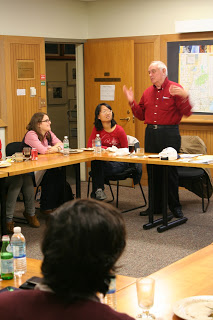On Thursday evening, October 7, Ray Burton, one of five members of the New Hampshire Executive Council, and Mike Cryans, one of three members of the Grafton County Commission, met with students in Professor Ron Shaiko’s PBPL 45: Introduction to Public Policy Research class over dinner to discuss the unique characteristics of New Hampshire state, county, and local governments. New Hampshire is unique in its establishment of the Executive Council or Governor’s Council. The state does not have a lieutenant governor; rather it has a five-member council with powers far greater than those of lieutenant governors in other states. Dating back to 1679 the Council was adapted from the privy council model in place under the British monarchy at that time.
 |
| NH Executive Councilor Ray Burton addresses the PBPL 45 Introduction to Public Policy Research class on Thursday, October 7, 2010. |
Mr. Burton explained to the students the many responsibilities vested in the Executive Council. All state departments and agencies must seek approval of receipts and expenditures of state and federal funds, budgetary transfers within the departments and all contracts with a value of $5,000 or more. With a biennial state budget of more than $11 billion, this task involves the approval of thousands of expenditures, transfers, and contracts. The Council also has appointment and removal power for executive branch positions, state commissioners, and regulatory board members as well as the approval of all state judicial appointments.
In addition to his duties as Executive Councilor at the state level, Ray Burton also serves with Mike Cryans as Grafton County Commissioner. Burton and Cryans discussed with the students the unique nature of county government in New Hampshire. The three-member, elected commission, along with the appointed County Executive Director, manage the operations of county government. However, the elected state legislative delegation representing Grafton County in Concord, plays a significant role in creating the county budget for the Commission to administer.
Students questioned Burton and Cryans about the interactions between state, county, and local governments as well as on the current tax structure of the state. They also asked about the realities of running for office in New Hampshire.
